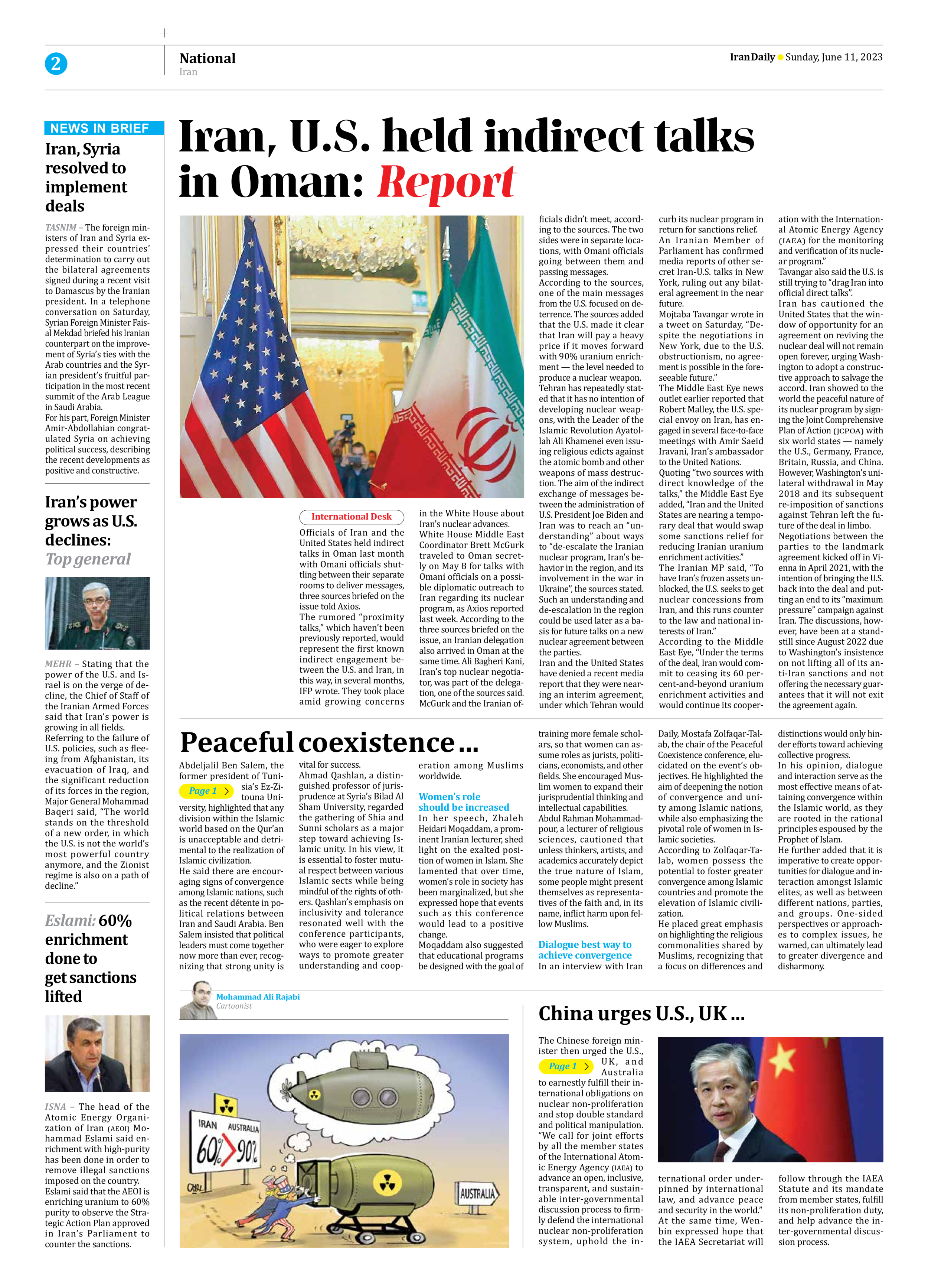
Iran, U.S. held indirect talks in Oman: Report
Officials of Iran and the United States held indirect talks in Oman last month with Omani officials shuttling between their separate rooms to deliver messages, three sources briefed on the issue told Axios.
The rumored “proximity talks,” which haven’t been previously reported, would represent the first known indirect engagement between the U.S. and Iran, in this way, in several months, IFP wrote. They took place amid growing concerns in the White House about Iran’s nuclear advances.
White House Middle East Coordinator Brett McGurk traveled to Oman secretly on May 8 for talks with Omani officials on a possible diplomatic outreach to Iran regarding its nuclear program, as Axios reported last week. According to the three sources briefed on the issue, an Iranian delegation also arrived in Oman at the same time. Ali Bagheri Kani, Iran’s top nuclear negotiator, was part of the delegation, one of the sources said.
McGurk and the Iranian officials didn’t meet, according to the sources. The two sides were in separate locations, with Omani officials going between them and passing messages.
According to the sources, one of the main messages from the U.S. focused on deterrence. The sources added that the U.S. made it clear that Iran will pay a heavy price if it moves forward with 90% uranium enrichment — the level needed to produce a nuclear weapon.
Tehran has repeatedly stated that it has no intention of developing nuclear weapons, with the Leader of the Islamic Revolution Ayatollah Ali Khamenei even issuing religious edicts against the atomic bomb and other weapons of mass destruction. The aim of the indirect exchange of messages between the administration of U.S. President Joe Biden and Iran was to reach an “understanding” about ways to “de-escalate the Iranian nuclear program, Iran’s behavior in the region, and its involvement in the war in Ukraine”, the sources stated.
Such an understanding and de-escalation in the region could be used later as a basis for future talks on a new nuclear agreement between the parties.
Iran and the United States have denied a recent media report that they were nearing an interim agreement, under which Tehran would curb its nuclear program in return for sanctions relief.
An Iranian Member of Parliament has confirmed media reports of other secret Iran-U.S. talks in New York, ruling out any bilateral agreement in the near future.
Mojtaba Tavangar wrote in a tweet on Saturday, “Despite the negotiations in New York, due to the U.S. obstructionism, no agreement is possible in the foreseeable future.”
The Middle East Eye news outlet earlier reported that Robert Malley, the U.S. special envoy on Iran, has engaged in several face-to-face meetings with Amir Saeid Iravani, Iran’s ambassador to the United Nations.
Quoting “two sources with direct knowledge of the talks,” the Middle East Eye added, “Iran and the United States are nearing a temporary deal that would swap some sanctions relief for reducing Iranian uranium enrichment activities.”
The Iranian MP said, “To have Iran’s frozen assets unblocked, the U.S. seeks to get nuclear concessions from Iran, and this runs counter to the law and national interests of Iran.”
According to the Middle East Eye, “Under the terms of the deal, Iran would commit to ceasing its 60 percent-and-beyond uranium enrichment activities and would continue its cooperation with the International Atomic Energy Agency (IAEA) for the monitoring and verification of its nuclear program.”
Tavangar also said the U.S. is still trying to “drag Iran into official direct talks”.
Iran has cautioned the United States that the window of opportunity for an agreement on reviving the nuclear deal will not remain open forever, urging Washington to adopt a constructive approach to salvage the accord. Iran showed to the world the peaceful nature of its nuclear program by signing the Joint Comprehensive Plan of Action (JCPOA) with six world states — namely the U.S., Germany, France, Britain, Russia, and China. However, Washington’s unilateral withdrawal in May 2018 and its subsequent re-imposition of sanctions against Tehran left the future of the deal in limbo.
Negotiations between the parties to the landmark agreement kicked off in Vienna in April 2021, with the intention of bringing the U.S. back into the deal and putting an end to its “maximum pressure” campaign against Iran. The discussions, however, have been at a standstill since August 2022 due to Washington’s insistence on not lifting all of its anti-Iran sanctions and not offering the necessary guarantees that it will not exit the agreement again.







